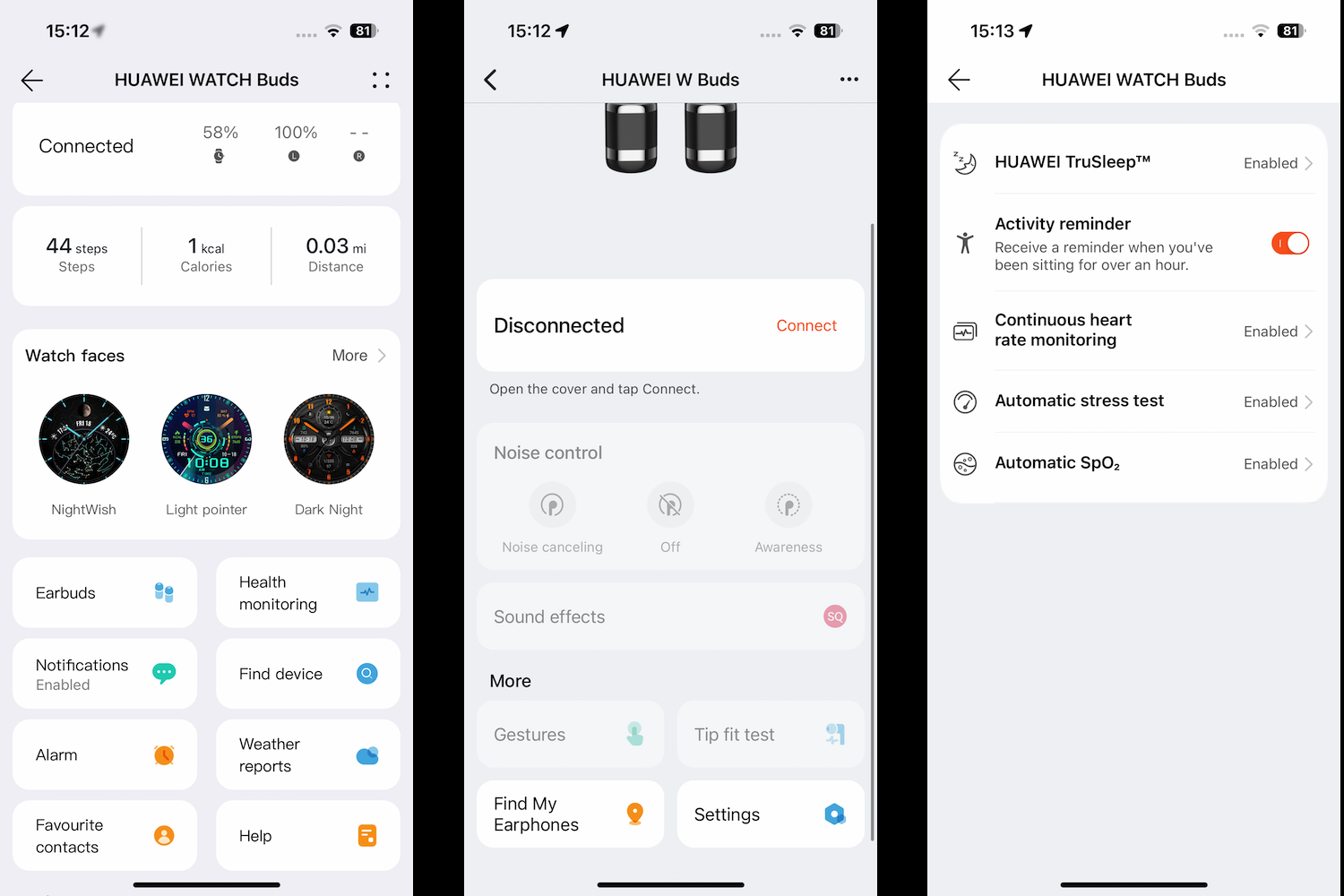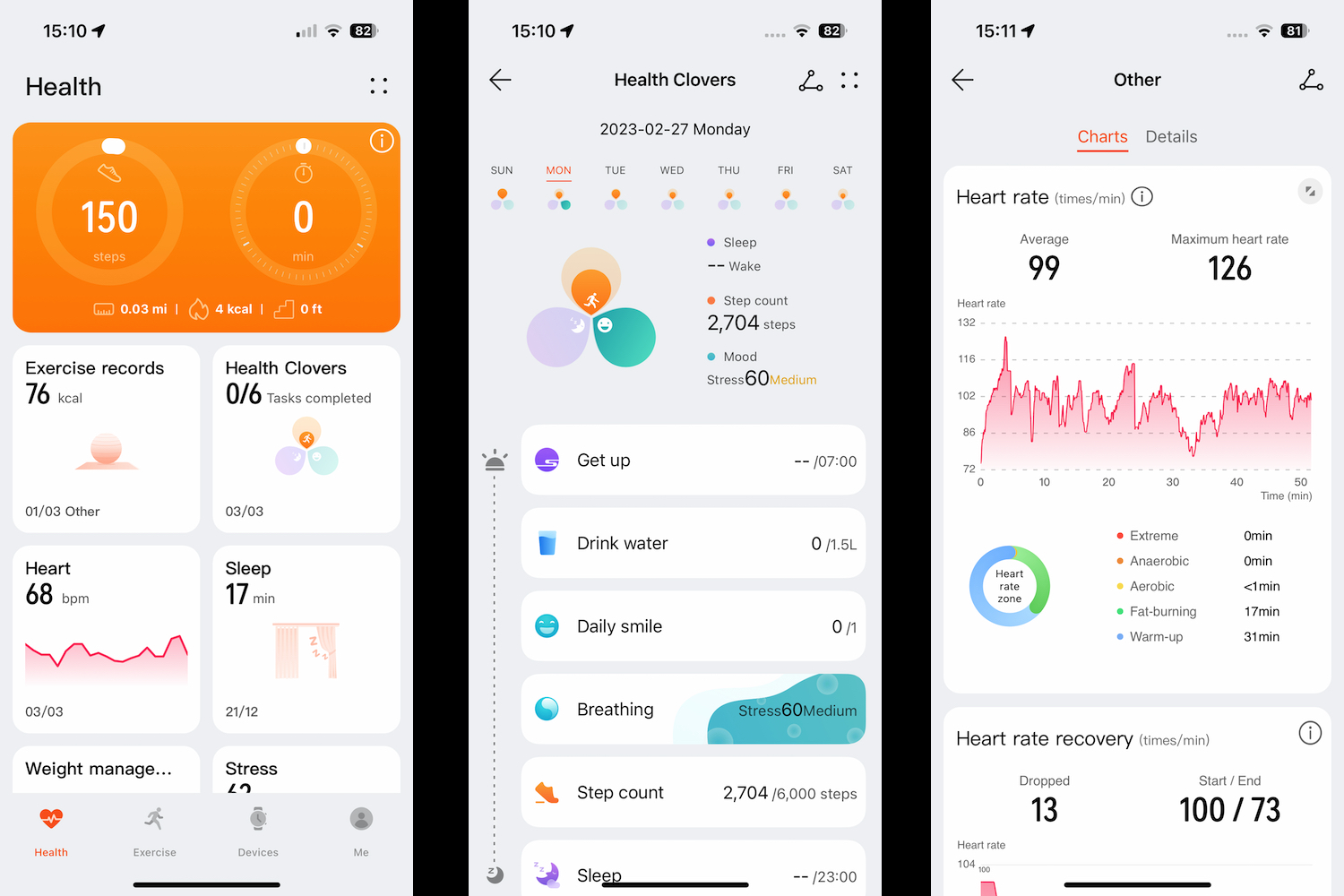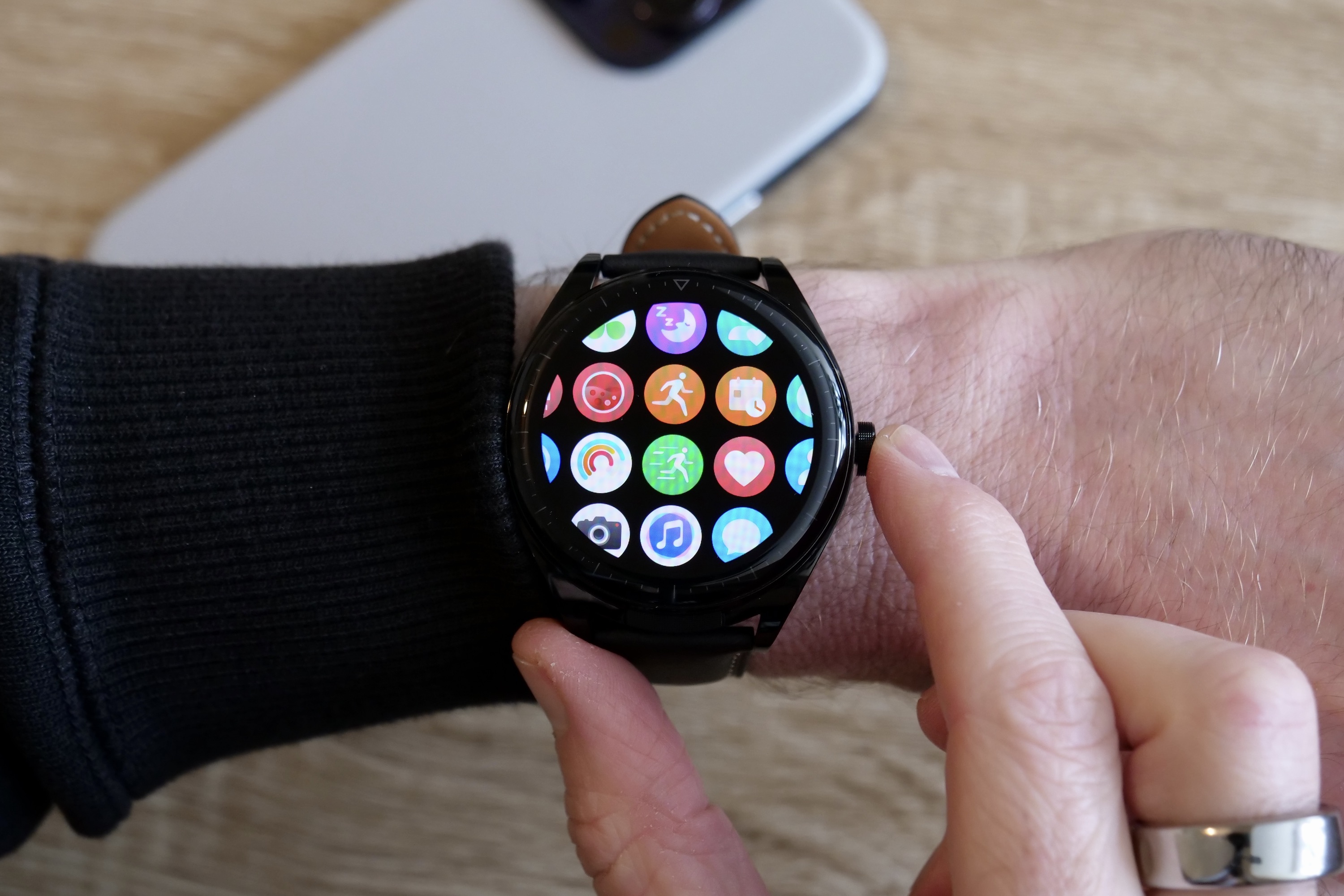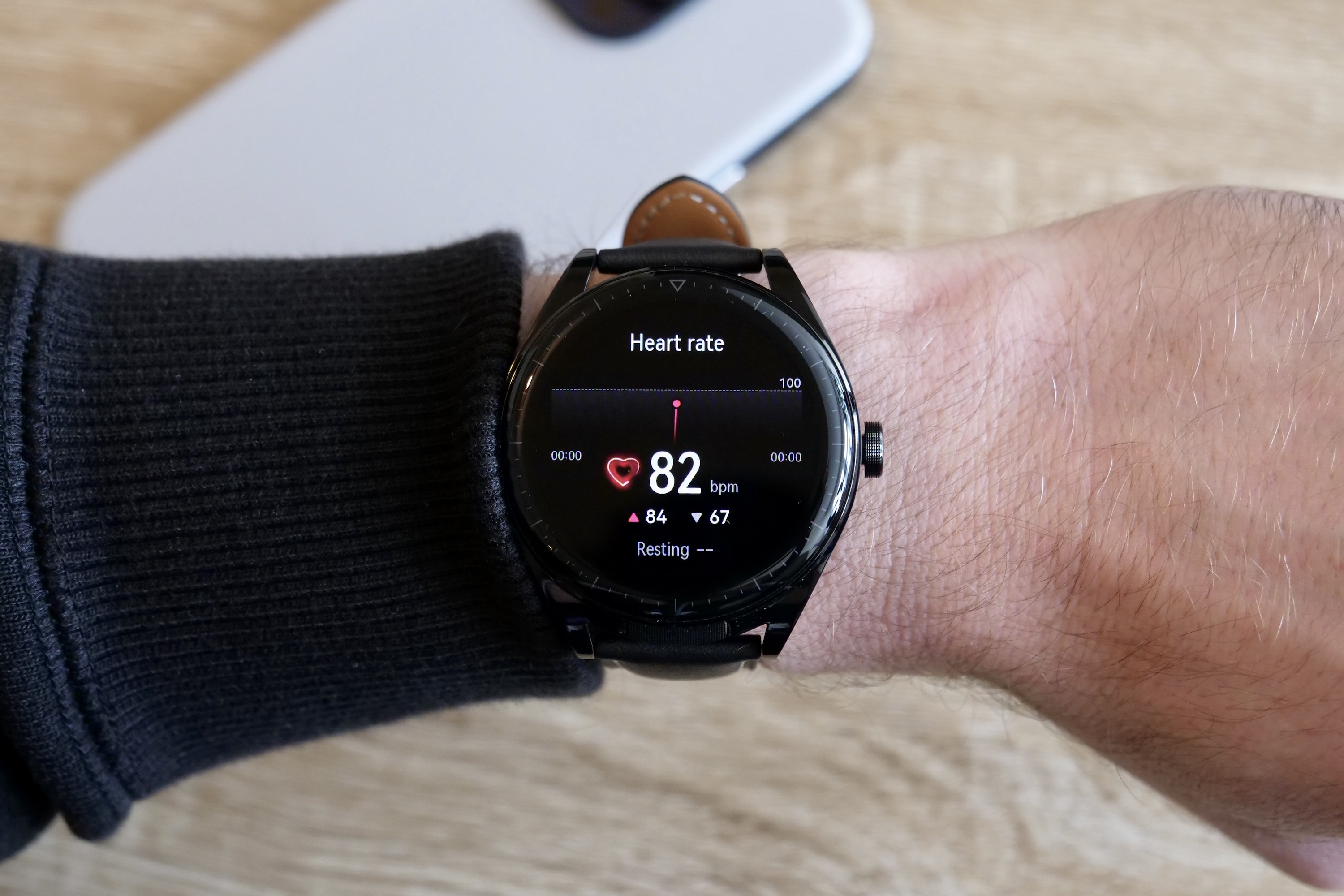“The Huawei Watch Buds do potentially solve a common problem, but a crucial missing feature and sky high price means there are other better and cheaper alternatives.”
- Your earbuds are always on hand
- Neatly engineered
- Initial novelty factor is huge
- Short earbud battery life
- Only average ANC performance
- Earbuds currently only connect with your phone
- Connection to Android phones is frustrating
Do you often find yourself searching for a pair of wireless earbuds, always at the time you need them most, or simply forget to take them out with you? If so, the Huawei Watch Buds are for you, as the normal-looking smartwatch has a pair of true wireless earbuds hidden inside it. You press a button, the top of the watch flips up, and you pull out a tiny pair of ‘buds — putting an end to the problems mentioned above.
It sounds a bit silly, and there’s no doubt that it is. But I know I’ve found myself needing a pair of earbuds and not having them on me, so there is a use case here. Unfortunately, there’s one very important feature missing at the moment, which made them impossible for me to live with, and that was before realizing what else I could get for the same price.
Huawei Watch Buds: watch design

Huawei knows how to make a good smartwatch. From the original Huawei Watch to the Watch GT 3 (whether in Porsche Design form or not), its smartwatches have a desirable style and are a good alternative to small, minimalist models like the Pixel Watch. The Huawei Watch Buds’ design is almost up to its existing levels, but not quite. The stainless steel case is a good start, but what’s around it is less enticing.
Huawei points out the crown has a clous de Paris finish (an embossed finish sometimes found on the bezel of a luxury watch), but it’s so subtle you’d never know. The case is attached to a simple leather band, and the small lugs are curved but don’t give the watch much character. The screen has a steep 3D curve before it meets the case, and is made of lithium aluminum silicate, which may give it some decent scratch resistance, but it feels like plastic under your finger. Worse, it sounds like plastic when you tap it, and when you latch it back into place after taking out the earbuds too.

Let’s talk about the way it opens, as it’s the best thing about the design. Press the button at the 6 o’clock position, and the entire top of the watch pops up — revealing two, tiny earbuds magnetically attached to the underside. It’s really neat, and there is something cool and fun about the Watch Buds. The earbuds are securely held in place with magnets, and it’s easy to take them out and put them back in. It is just like having a true wireless headphone case attached to your wrist. However, the plasticky look and sound of the watch do feel a little cheap, and that’s not good because this is not a cheap product.
What’s it like when you’re wearing it? At 77 grams, it’s not particularly heavy, but at 15mm, it is quite thick — and the slab-sided design does make it feel quite bulky. The leather strap gets sweaty, but it’s very supple from the minute you put it on, which will appeal to some.

With the watch closed, it has an IPX7 water resistance rating, but no dust resistance at all, and nothing when the watch is open either. The earbuds have a basic IPX4 water resistance rating, so they will be fine for use in the rain and when exercising.
While some smartwatches want to be a bit like a good traditional watch, the Huawei Watch Buds is unashamedly a piece of technology. Although there is a degree of sci-fi fun about having the earbuds inside, you won’t feel any love or attachment to the product itself, and I do think that’s important for something we wear.
Huawei Watch Buds: earbuds design

If you’re going to store a pair of earbuds inside a smartwatch, they need to be small, and the Watch Buds really succeed here. They’re tiny, just 21mm long and 10mm across, and weigh only 4 grams each. They haven’t got a flashy design or any long stems. They’re like tiny bullets you stuff in your ears. Despite the underside of the watch’s dial showing an L and R position, the Watch Buds don’t have a strict left or right earbud. They cleverly understand which ear they’re placed in and adjust the sound accordingly. It also doesn’t matter how they’re placed inside the watch, provided the tip is facing down, so they’re very easy to live with.
I’m not sure about the fit, though. Huawei supplies them with three different sizes of ear tips, but none fit very well in my ears, slowly working their way loose as I talk and move around. At first, I couldn’t get them to seal properly in my ears either, but then I jammed them in differently, which solved that problem but created a new one. With them sealed like this, I could hear myself breathe, suggesting it wasn’t the right fit. This becomes distracting after a while. They are really small, though, so they don’t attract attention. If anything, they look more like oversized hearing aids than tiny true wireless earbuds.

The control system is interesting, but only moderately competent and surprisingly restrictive. There’s a single double tap feature that enables the earbuds to play and pause, to choose the next or previous track, or to wake the virtual assistant. There’s no option to do all these things using different gestures, and there’s no way to change the volume on the earbuds directly either. A triple tap controls active noise cancellation (ANC) or ends a call.
You don’t have to tap the earbuds either, as it also recognizes taps on parts of your ear. Well, it sometimes does. As with all tap-based gesture controls, it doesn’t always work, and it’s frustratingly common to repeatedly tap your ear trying to pause and play. Tapping the earbuds is far more reliable than tapping your ear, but the gesture control options are so limited you’ll end up reaching for your phone often too.
Huawei Watch Buds: connection

Connecting the Huawei Watch Buds to your phone can be a bit of a pain. Like all recent Huawei smartwatches, if you have a Huawei phone, the connection is seamless and no problem at all. If you have an iPhone, it’s surprisingly easy too. But if you have a non-Huawei Android phone, it can be a pain. It requires the Huawei Health app, which is available in the Apple App Store, but must be downloaded through the Huawei App Gallery or directly from Huawei’s website for Android.
On Android, you must accept privacy and security risk notifications to get the Health app on your phone and then spend some time manually giving the app permission to send notifications, track location, manage calls, and so on.
Frustratingly, this isn’t a simple process, and when I connected it to the Xiaomi 13 Pro, the phone refused to give notification access at all. It can be altered if you spend time online searching for a way, but this is annoying to do, and just part of a very bad onboarding experience in general.
Once it is connected and permissions are given correctly, the watch works reliably and receives notifications. I’ve also had the watch connected to an iPhone 14 Pro, and it works very well. Connection and syncing are much easier, and the prompts for giving it access are simpler too. However, there’s no way you should be buying the Watch Buds for your iPhone when the Apple Watch Series 8 is by far the better smartwatch.
Huawei Watch Buds: audio quality

The most important thing to know is — at the time of writing — you can only connect the Huawei Watch Buds earbuds to your phone. There is no option to connect the earbuds to your computer, tablet, or another device. It is entirely linked to the phone the smartwatch has been paired with. In the documentation provided with the Watch Buds to reviewers, it states this feature will be enabled in a future software update, but there is no time scale provided.
This is a massive problem. Like many, I use headphones for a variety of purposes on different devices during the day, and if the earbuds only connect to my phone and not my computer, they lose a lot of value. It entirely defeats the object of buying a product that’s “always with me” if it only works with one device. Should I carry another pair of earbuds too? No, I should just buy a normal pair of earbuds and get better at remembering them.

Sound is delivered through a quad magnet planar driver, and the earbuds support SBC, AAC, and L2HD codecs. I like the sound, but mostly when it’s left on the Default or Voices sound profile in the Health app. The Bass Boost setting exposes how poor they are when the bass gets heavy, as it’s muddy and uncontrolled. For casual listening, they’re great, but don’t expect to do any “critical” listening — just as you’d expect from this kind of product. Calls and spoken word sound good, and if you can stand the oddly isolating fit, they can even work well to sleep in too.
The Huawei Watch Buds have ANC (active noise cancellation), and for general on-the-street use, it’s passable. But it’s easily surpassed by the Apple AirPods Pro 2, and when walking near loud traffic, the Watch Buds didn’t filter out the sound enough — making me reach for the volume control to compensate. Overall, once you get used to the fit, and accept they currently only work with your phone, the Huawei Watch Buds are solid everyday earbuds, and it really is convenient to always have them to hand.
Huawei Watch Buds: smartwatch features

The earbuds are only part of the package. The Huawei Watch Buds smartwatch has a 1.43-inch screen and Huawei’s TruSeen 5.0+ sensor on the back to keep track of your heart rate and blood oxygen levels. All data is stored and viewed in the Huawei Health app. The HarmonyOS operating system is the same as that on the Watch GT 3 Pro, and I go into detail about what it’s like to use in that review.
There are some things to talk about separately, though. The amusingly named Healthy Living Shamrock has evolved to become Health Clovers, and it works in a similar way, with your daily efforts filling up each leaf. The trouble is, filling those leaves takes some manual effort, like adding how much water you drink, and (bizarrely) adding a daily smile that requires photographic proof! It also adds sleep into the mix, but I found the Huawei Watch Buds too uncomfortable — a combination of the size, design, and strap — to wear overnight.
The awkward setup process doesn’t make the Huawei Watch Buds feel very user-friendly
This means you end up never filling all the leaves, and it just kills motivation. Apple’s Ring system is automatic and more motivational, as it’s clear about what you need to do in order to meet your goals. The Health Clover is too complicated. You can see steps and activity on the watch face, but only as a simple ring system with no other information. It’s one of the tiles accessed by swiping left or right on the screen, and joined by call details, music controls, heart rate, and weather details. There’s a maximum of six tiles available.
The workout mode tracks 80 different types of exercise, but there’s no shortcut to the app or dedicated widget. It turns off the always-on display and locks the screen when it’s running, and auto-detection is off by default. The workout screen is informative, but the design isn’t very attractive, and starting and stopping workouts is a bit long-winded compared to the Apple Watch in particular. Although the Huawei Watch Buds is supposed to sync with Apple’s HealthKit, and it was enabled on both sides, none of the data transferred for me. The smartwatch’s performance when navigating the menus is acceptable.

What else? There are several odd default settings. The always-on screen is off by default, but even with it on, you have to press the crown to interact with the screen. The unnecessary added step is annoying, but if you dig into the settings you can adjust the watch to show the main watch screen when you simply raise your wrist instead, with no need to press the crown.
Why is it like this? It’s another frustration you discover during the early stages, and they don’t make the watch very appealing. The awkward setup process doesn’t make the Huawei Watch Buds feel very user-friendly, and the odd default settings don’t help, while the activity tracking system can’t match the ones from Apple or Samsung either.
Huawei Watch Buds: battery and charging

Huawei smartwatches without earbuds inside are quite power efficient, with a single charge lasting around 10 days. I’ve found the Huawei Watch Buds smartwatch will last for between five and seven days with the always-on screen active, and with modest use of the earbuds. Huawei claims approximately three hours of use from the earbuds with a full charge and ANC on. This fits in with my own experience.
However, the internal battery also charges the earbuds when they are placed back inside the watch, so any battery life you think you have remaining can quickly be eaten up. For example, when the watch had 19% battery remaining I placed the earbuds back inside it. Within an hour, the earbuds had been charged back up from around 85%, and that left the watch with 9% battery left after a very short time. There doesn’t seem to be a way to override the charging system to preserve the watch’s runtime, and it may cause a problem in some situations.

While I rarely need more than three hours of continuous use from my earbuds, there will be others who do, and the Watch Buds can’t match the use time available from most other true wireless headphones available. Plus, because the battery is also powering the watch, you won’t get the same combined battery time as you do from a charging case and earbud combination either.
It’s important to understand your own requirements before buying the Huawei Watch Buds, as some may find the longer battery life from a separate smartwatch and earbud package makes more sense.
Huawei Watch Buds: price and availability

The Huawei Watch Buds are not available to buy in the U.S. They are out now in the U.K., where they cost 450 British pounds, which is about $540. For this price, you are getting two products — a smartwatch and a pair of true wireless earbuds — but does that make the high price a decent value?
Not really. The Apple Watch SE 2 starts at $250, and the Samsung Galaxy Watch 5 is even cheaper at $230, and these are two of the best smartwatches you can buy at the moment. You’ll pay more for bigger versions. There are dozens of true wireless earbuds available, and many of the best won’t cost you much more than $250. If you’re shrewd, some can cost much less, and still sound superb.
It’s entirely possible to spend the same amount of money, if not considerably less, on two separate products that are better than the Huawei Watch Buds.
Even if you’re set on buying Huawei products, you can do better for a lot less. The Huawei Watch GT 3 Pro Titanium is 240 pounds, and you can add the Huawei FreeBuds 5i earbuds for just 70 pounds extra. No, the FreeBuds don’t fit inside the Watch GT 3, but with such a substantial saving to be had, plus longer battery life from a higher quality smartwatch with very similar functionality, most probably won’t care. I know I wouldn’t.
It’s entirely possible to spend the same amount of money, if not considerably less, on two separate products that are better than the Huawei Watch Buds. What’s more, the earbuds will connect to any device you like, unlike the Watch Buds at this time. Yes, you’ll have to remember to take the earbuds with you all the time or have some patience digging for them in your bag, but it’s not like the Huawei Watch Buds are entirely free of frustration.
Huawei Watch Buds are a novelty, but not a necessity

I smiled the first time I popped the watch open and took out the earbuds. It’s a unique, fun experience that’s unlike any other smartwatch, and the engineering that went into making this possible is impressive. The earbuds sound good for general use, and the smartwatch will deliver your notifications and track your exercise. But once the novelty of popping the top has passed, you quickly realize the product’s drawbacks.
The inability to connect with other devices ruined it for me, as I constantly swap between devices during the day. The feature will apparently be enabled, but until then, the Watch Buds doesn’t fit my needs — and I suspect it will be the same for others too. Getting the watch connected and working on an Android phone that isn’t made by Huawei is a pain, the smartwatch’s default settings are too focused on power management, the health tracking system isn’t as clear and motivational as the competition, the earbuds have only average noise cancelation, and the sometimes problematic fit is frustrating.
On top of this, the price is simply too high to make sense. Huawei makes good smartwatches and true wireless headphones, and you can get both separately for a lot less money than the Watch Buds. Or, for about the same price, you can buy one of the best smartwatches available and a pair of great true wireless earbuds with longer battery life and better sound. No, the watch won’t have a flip top and the buds won’t hide inside, but believe me — that novelty soon wears off.








